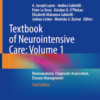Weaning the patient: between protocols and physiology
pubmed.ncbi.nlm.nih.govVentilator weaning forms an integral part in critical care medicine and strategies to shorten duration are rapidly evolving alongside our knowledge of the relevant physiological processes.
The purpose of the current review is to discuss new physiological and clinical insights in ventilator weaning that help us to fasten liberation from mechanical ventilation.
Several new concepts have been introduced in the field of ventilator weaning in the past 2 years.
Approaches to shorten the time until ventilator liberation include frequent spontaneous breathing trials, early noninvasive mechanical ventilation to shorten invasive ventilation time, novel ventilatory modes, such as neurally adjusted ventilatory assist and drugs to enhance the contractile efficiency of respiratory muscles.
Equally important, ultrasound has been shown to be a versatile tool to monitor physiological changes of the cardiorespiratory system during weaning and steer targeted interventions to improve extubation outcome.
A thorough understanding of the physiological adaptations during withdrawal of positive pressure ventilation is extremely important for clinicians in the ICU.

















